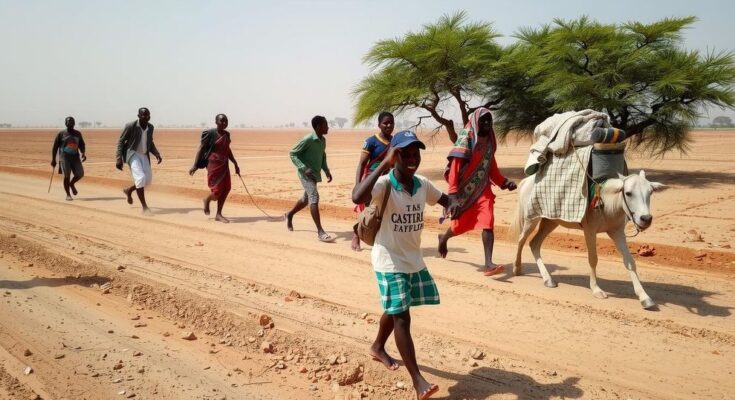This case study examines the impacts of climate change on pastoralist migration in Northern Senegal, focusing on male herders’ decision-making and its implications for women who remain at home. It highlights the gendered aspects of climate mobility and outlines adaptation strategies employed by these communities in response to climate variability.
The ongoing impacts of climate change are increasingly manifesting in varied and complex ways across Senegal, particularly influencing the livelihoods of pastoralist communities. This case study investigates the internal migration trends among herders in northern Senegal’s Ferlo Reserve, specifically examining how climate variability informs their movement to the southern Kédougou region. It explores the aspirations for migration, the climate risks encountered, and adaptation strategies that are employed both in their rural homes and in semi-urban destinations.
A significant focus is placed on gender dynamics, particularly the use of internal migration by male herders to cope with new climate-related challenges affecting their home environment. The research also highlights the repercussions of these migration patterns on female herders who remain in their villages, thereby addressing a gap in understanding the dual aspects of climate mobility and immobility. Primary research data was gathered through semi-structured interviews and focus group discussions involving 133 participants, including herders from both origin and destination areas, along with key informant interviews and a thorough review of relevant literature.
The ultimate objective of this study is to enhance understanding of climate mobility in the Senegalese context, particularly from a gender perspective, thereby informing the development of gender-responsive adaptation strategies that are grounded in empirical evidence.
Climate change poses significant challenges for human activities worldwide, with Senegal being no exception. In Northern Senegal, pastoralists face increasingly difficult conditions as climate variability disrupts traditional lifestyles. This research examines the resultant internal migration decisions of herders within this context, emphasizing the differentiated impacts of these migrations on men and women. Recognizing migration as a potential adaptation strategy is crucial, particularly in environments where climate change is a central influencing factor.
In conclusion, this case study reveals the profound effects of climate change on pastoralist migration in Northern Senegal, particularly through a gendered lens. The findings illustrate how male herders utilize internal migration as a response to climatic stressors, while the implications of their migration profoundly affect the women who remain behind. Understanding these dynamics is essential for developing gender-sensitive adaptation strategies that effectively address the challenges posed by climate change.
Original Source: reliefweb.int




